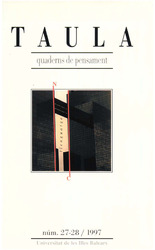|
Abstract:
|
[SPA] Aranguren, en el plano de la moral personal, establece tres dimensiones de la misma, distinguibles teóricamente, pero no separables en la práctica. En la primera dimensión, en la moral como estructura, el hombre es constitutivamente moral porque la moral emerge desde sus propias estructuras antropológicas sobre las que se levantarán los distintos contenidos morales. Lo moral es esencial e inherente al hombre porque los actos humanos, los actos inteligentes, racionales y libres, independientemente de que se practique el bien o el mal, son siempre estructuralmente morales. En definitiva, el hombre es constitutivamente moral porque ha de hacer, necesariamente, su vida. En la seguida dimensión, en la moral como contenido, queda patente que no basta con que el hombre haga por sí mismo su vida, y con ella y por encima de ella, el carácter, 8rlios o personalidad moral, sino que, además, es preciso que la realice conforme a una idea de hombre, conforme a una 'norma moral, en función de una escala de valores que nos permita precisar cómo debe ser nuestra realidad moral. La vida se debe hacer conforme a un determinado proyecto fundamental y con arreglo a unas normas de razón. Esta nueva dimensión de la moral debe construirse a partir de la moral como estructura, sin la cual no tiene razón de ser. Por último, y en tercer lugar, encontramos la moral con la actitud, en la que se distingue claramente entre la actitud ética como esfuerzo activo del hombre por ser justo, por implantar la justicia y la actitud religiosa como entrega creyente, confiada y amorosa a la gracia de Dios. Ambas actitudes, la ética y la religiosa, no deben separarse, sino que se ha de buscar el justo, aunque problemático, equilibrio y complemento. El catolicismo, en Aranguren, es la síntesis superadora de la tesis justicia y de la antítesis gracia. ; [ENG] Aranguren, establishes three dimensions in the level of personal morals, which can be distinguished only in theory, but not separable in practice, In the first dimension, in morals as a structure, man is moral by nature because morals emerge from his own anthropological structures on which different moral contents are constructed. Morals are essential and inherent to man, because human, intelligent, rational, and free. actions are always structurally moral regardless of good or bad behavior. To sum up, man is moral by nature because he has to develop his own life. In the second dimension, in morals as a content, it's clear that it is not enough for man to act out. his own life, and along with and above it, character, êthos, or moral personality. It is also necessary that he perform according to a concise idea of man, with reference to a moral rule and in accordance to a scale of values that permits us to define how our moral reality should be. Life should be lived according to a concise fundamental project and rules of reasoning. This new dimension of morals must be constructed on morals as a structure, without which it wouldn't have any meaning. Finally, and in third place, we find morals as an attitude, in which we can clearly discern between ethical attitude as an active effort of man to be just, to implant justice, and religious attitude as faithful, trusting and loving devotion to God's grace. Both attitude, ethical., and religious, must not be separated but the just, thought problematic, equilibrium and complement must be sought. Catholicism in Aranguren, is the surpassing synthesis of justice as thesis and grace as antithesis.. |

 Las dimensiones de la moral en Aranguren: la moral como estructura, la moral como contenido y la moral como actitud
Las dimensiones de la moral en Aranguren: la moral como estructura, la moral como contenido y la moral como actitud